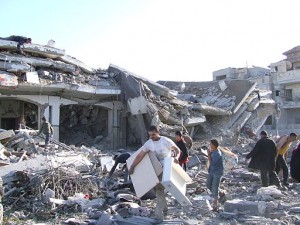Hamas and the Tragedy of the Palestinian People

Air-strikes from Israel and Rockets from Hamas have devastating effects on the people of both sides.
Israel’s current military incursion into Gaza has brought more misery to the people of Palestine, and is yet another clash with the militant group Hamas. The two sides have been at odds with one another for many years and currently it seems that they will be for many more to come. How, you might wonder, did it come to this?
Gaza has suffered occupation by foreign powers throughout its history. For 400 years it was part of the Ottoman Empire, which ended in 1948. At the end of the First World War it was part of the British Mandate Territories established under the Treaty of Versailles. The creation of the state of Israel in 1948 caused a catastrophic upheaval of the Arab population; 750,000 refugees left Gaza. Today, two thirds of the population (1.8 million) remain refugees or are the embittered descendants of displaced families.
In 1967, as a result of the Six Day War, Israel occupied Gaza, the West Bank and East Jerusalem, beginning a policy of settlement building. In 1987, the first Intafada (Uprising) began as a response to the deaths of four Palestinian youths killed in a collision between an Israeli military vehicle and a car. It was then that Hamas, The Islamic Resistance Movement, was formed, with its origins in Egypt’s Muslim Brotherhood, actively promoting that organisation’s policies and offering the people of Gaza welfare assistance, healthcare and education. Hamas also developed a military wing, the Al Quassam Brigade, dedicated to the destruction of the Jewish state.
By the early 1990’s Hamas had become more militant, and its military branch attacked targets deep inside Israel using suicide bombers. Not all their victims were Jews; in 1994, they assassinated over 30 Muslims in a Hebron mosque. However, by 2013, Hamas had suffered a string of catastrophic failures; an inability to deter Israeli military operations such as the assault of 2006, a failed state, and a basic fuelling of irreconcilable hatred between Jew and Arab alike.
In 2005, Israel withdrew from Gaza, and the following year Hamas won an unexpected electoral victory over its political rival, Fatah. Israel was thus given an opportunity to play off one Arab group against another, ensuring neither would achieve anything. In 2006, Israel tightened its blockade on Gaza, and this was followed by a full-scale military assault.
The “Arab Spring” of 2013 – 14 ultimately failed to produce a democratic regime in neighbouring Egypt, and disastrously for Hamas, the successful military, secular government crushed their backers, The Muslim Brotherhood. The timing could not have been worse, for just as their allies fell from grace, Hamas had chosen to launch increased rocket attacks into Israel, at a rate of around 300 per day. Without the Brotherhood’s backing, this has achieved nothing except to invite numerous retaliatory air-strikes and now another ground invasion of Northern Gaza aimed at destroying their launch sites and supply tunnel complex. Again and again the people suffer the consequences.
Neither antagonist can achieve a permanent solution to the complex issues of the region by military means alone. Hamas still denies the right of Israel to exist and Israel still, unsurprisingly, believes Hamas’ intention is to destroy its people. It is in the interests of the neighbouring Arab states to try to help, not to provoke a full-scale conflict. However, the political establishment of Arab Palestine is both divided and corrupt, ensuring any negotiations are made even more difficult. In all of this, one thing remains the same: the victims are the people.
